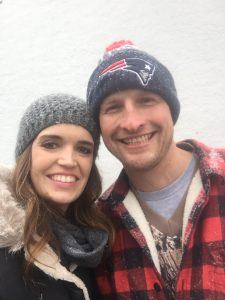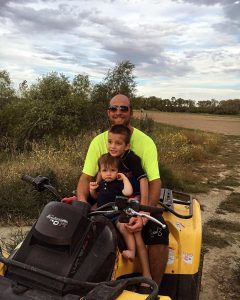 In 2019, Amy lost her husband, Adam, to undiagnosed Brugada Syndrome – leaving family, friends and their two young boys, who were just three and six years old at the time. Amy now serves on the Brugada Syndrome Steering Committee at the SADS Foundation to help other families navigating this rare diagnosis – and to prevent other people from losing their Adam.
In 2019, Amy lost her husband, Adam, to undiagnosed Brugada Syndrome – leaving family, friends and their two young boys, who were just three and six years old at the time. Amy now serves on the Brugada Syndrome Steering Committee at the SADS Foundation to help other families navigating this rare diagnosis – and to prevent other people from losing their Adam.
“Adam was a wild, loving spirit with the biggest smile and hugs,” says Amy. He was the type of person who made friends everywhere, even at the gas station on road trips. Even though he wasn’t usually a person who cried, he sobbed with joy throughout their wedding day from the second he saw Amy in her dress. Amy and Adam’s lives were expanding and growing both professionally and at home: Adam was a wonderful dad to his two sons (and was especially proud to be a boy dad), and had his own company – AW Power. “He cared so very deeply,” says Amy, “and was truly one-of-a-kind.”
Adam died unexpectedly on March 7, 2019 in his sleep at the age of 36.
“He left such a gaping hole in this life to all those who met and loved him especially myself, his boys, his family, his in-laws, and all his co-workers and friends,” says Amy.
After losing Adam, Amy asked the coroner what could have caused him to pass away suddenly. He was healthy, active and had no signs or symptoms that anything was wrong. The coroner told her that there was no way to genetically test someone who had passed away – which is not true. His words stick with Amy to this day: “He told me that ‘sometimes people just die.’”
“To have loved Adam and lost him has shattered me and our boys beyond pieces, but we are passionate about finding the cause and bringing Brugada awareness.”
This didn’t sit right with Amy, a medical professional, who knew that something had to have caused her to lose Adam. She was worried for her two boys, whose wild spirits remind her so much of Adam’s. “As I sat in my office one day, I had an overwhelming feeling to call the hospital that Adam had gone to eight years prior during an accident to see if they had his EKG,” says Amy. “They did. They sent it to me and I brought it with to the pediatric electrophysiologist (EP) who I had made appointments with for our boys after Adam’s sudden death. Their doctor, Dr. Burton, took two seconds to identify that Adam likely had Brugada syndrome. This ignited additional work-ups including genetics with a genetic variant in SNCA-10 gene that has been previously linked to Brugada, and a referral to Dr. Michael Ackerman at the Mayo Clinic.”
sat in my office one day, I had an overwhelming feeling to call the hospital that Adam had gone to eight years prior during an accident to see if they had his EKG,” says Amy. “They did. They sent it to me and I brought it with to the pediatric electrophysiologist (EP) who I had made appointments with for our boys after Adam’s sudden death. Their doctor, Dr. Burton, took two seconds to identify that Adam likely had Brugada syndrome. This ignited additional work-ups including genetics with a genetic variant in SNCA-10 gene that has been previously linked to Brugada, and a referral to Dr. Michael Ackerman at the Mayo Clinic.”
Another phrase that has stuck with Amy from her journey is the words of the pediatric EP on their very first visit: “This didn’t have to be your story.”
“To have loved Adam and lost him, has shattered me and our boys beyond pieces, but we are passionate about finding the cause and bringing Brugada awareness,” says Amy.
For those who’ve recently received a diagnosis – or who’ve recently experienced a tragic, sudden loss – Amy’s advice is to advocate for yourself if the answers you’re getting don’t feel right.
 “If I would have just said ‘okay’ to the coroner’s advice – that there was no way to test Adam – my family wouldn’t be where we are today,” she says. “Now we’re on a path with the right providers. The SADS Foundation has helped us walk this journey and all the unknowns of a rare disease, and helped us connect with the right providers and experts in this super rare field.”
“If I would have just said ‘okay’ to the coroner’s advice – that there was no way to test Adam – my family wouldn’t be where we are today,” she says. “Now we’re on a path with the right providers. The SADS Foundation has helped us walk this journey and all the unknowns of a rare disease, and helped us connect with the right providers and experts in this super rare field.”
Advocating is a way that Amy continues to fight for Adam, fight for their boys, and prevent what happened to him from happening to others. “I’m passionate about helping others who are walking this path – you’re not alone,” says Amy.
Amy’s sons still ask to hear their dad’s voice on his voicemail recording. His friends and family have gathered a book with nearly ninety stories of Adam’s life for them to read as they get older – so he can still be there with them as they grow.
“I see his wild, loving eyes in my boys now,” says Amy.

I am very sorry. Had he had symptoms in past? Or family history